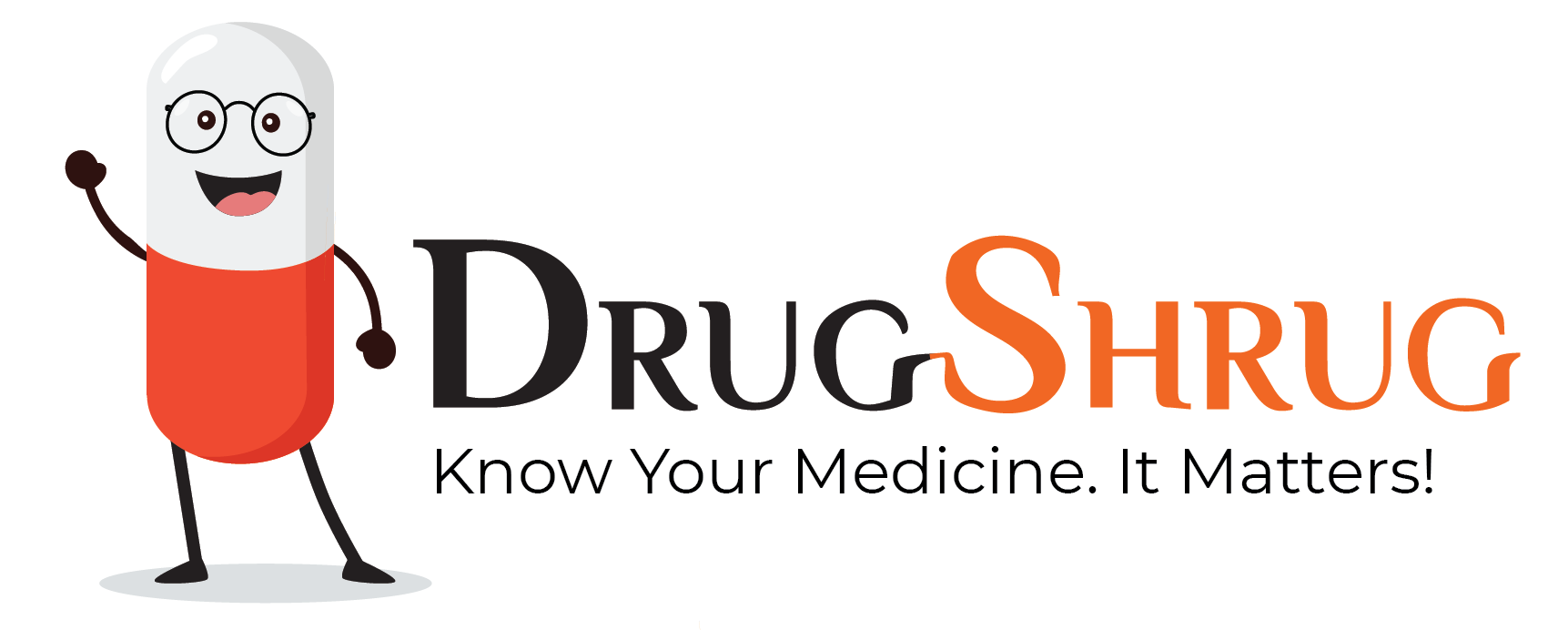What is Haloperidol?
Haloperidol is an antipsychotic medication prescribed to treat schizophrenia. This drug is also employed to regulate motor and speech twitches in people with Tourette’s syndrome. It may also be utilized for purposes not mentioned in this concise clinical guide.
What are the common conditions in which Haloperidol is prescribed?
This medication is recommended in the following conditions:
- To treat Schizophrenia
- To rectify motor and speech glitches in people with Tourette’s syndrome
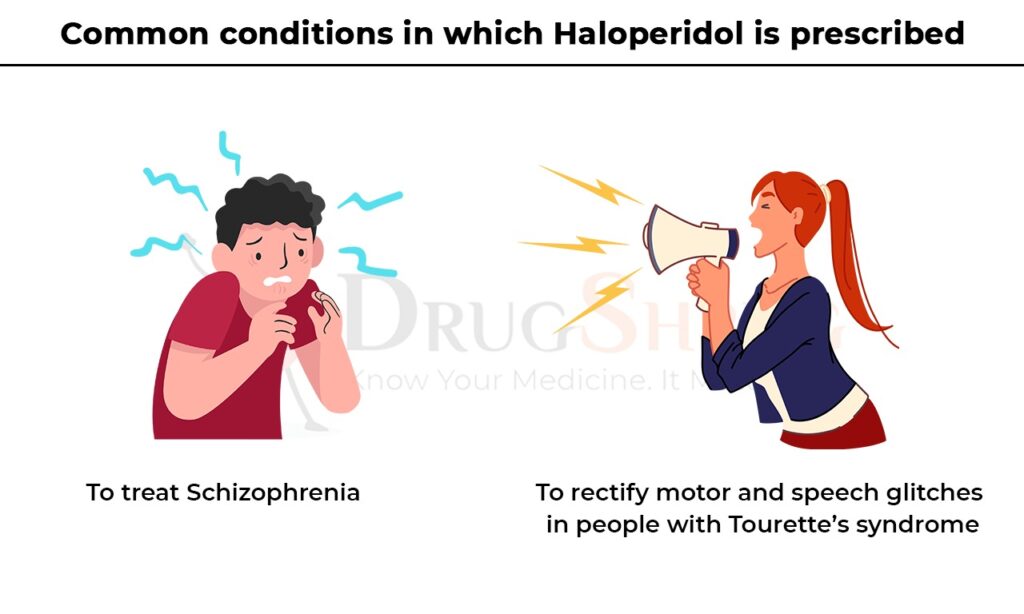
How should I take Haloperidol?
- Adhere closely to all the directives mentioned on your prescription label and medication guides. Your doses may be altered frequently by the doctor.
- Take the doses as per the recommendations of your medic since excess of haloperidol may be deadly and even cause heart rhythmic disorder.
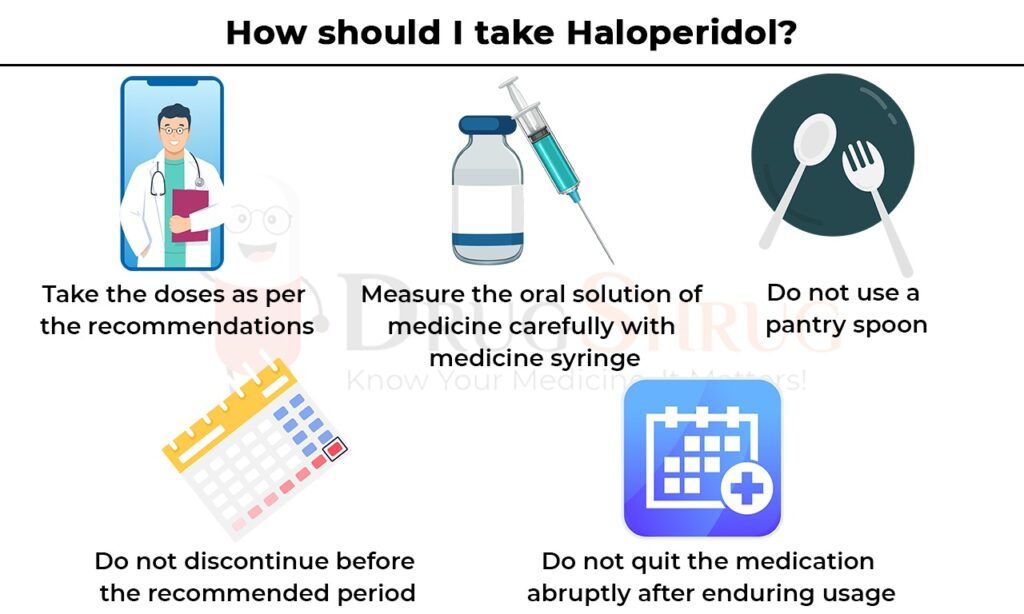
- You may administer this medicine with or without food.
- Measure the oral solution of medicine carefully with the help of dosing syringe given or with medicine syringe. However, do not use a pantry spoon.
- Do not discontinue before the recommended period as it may take few weeks to show any improvement. In case the symptoms do not give any hint of improvement talk to your doctor.
- Do not quit the medication abruptly after enduring usage, as this could result in serious withdrawal responses. You may enquire your doctor with regards to stopping the medicine intake.
- Store at room temperature in a cool, dark, and dry place. Avoid freezing the liquid medicine.
When should you not take Haloperidol?
Do not take this medicine if you are allergic to it or if you have any of the following:
- Parkinson’s disease; or
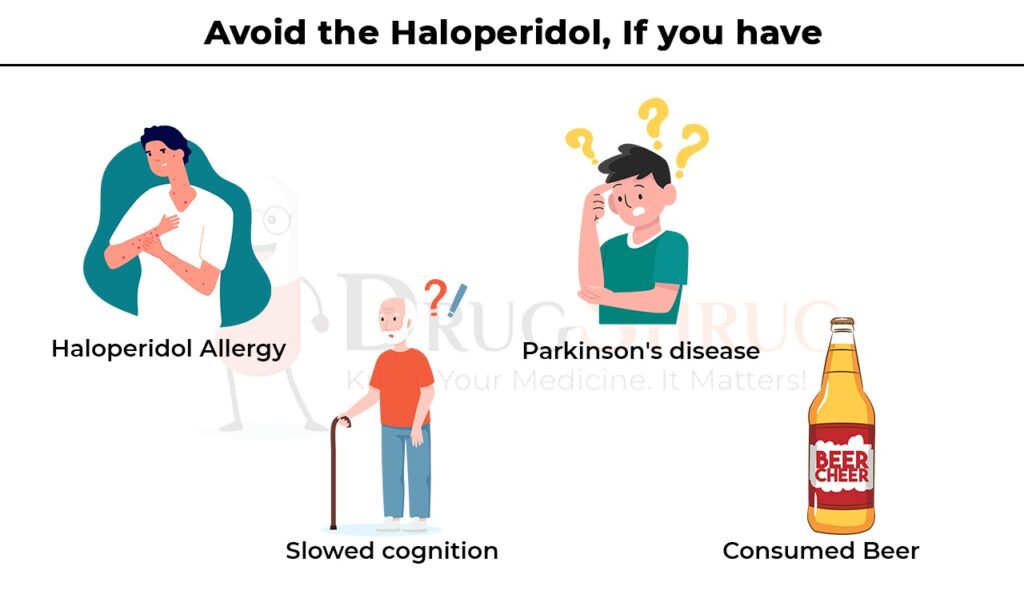
- Particular conditions that influence your central nervous system such as intense lethargy, or slowed cognition caused by using other pills or consuming alcohol.
Haloperidol is not sanctioned for use in older adults with dementia-related conditions. It is because it may pose the hazard of death in them.
Acquaint your doctor if you had:
- heart problems, chest pain;
- long QT syndrome either in your or in family member;
- low blood pressure;
- a seizure;
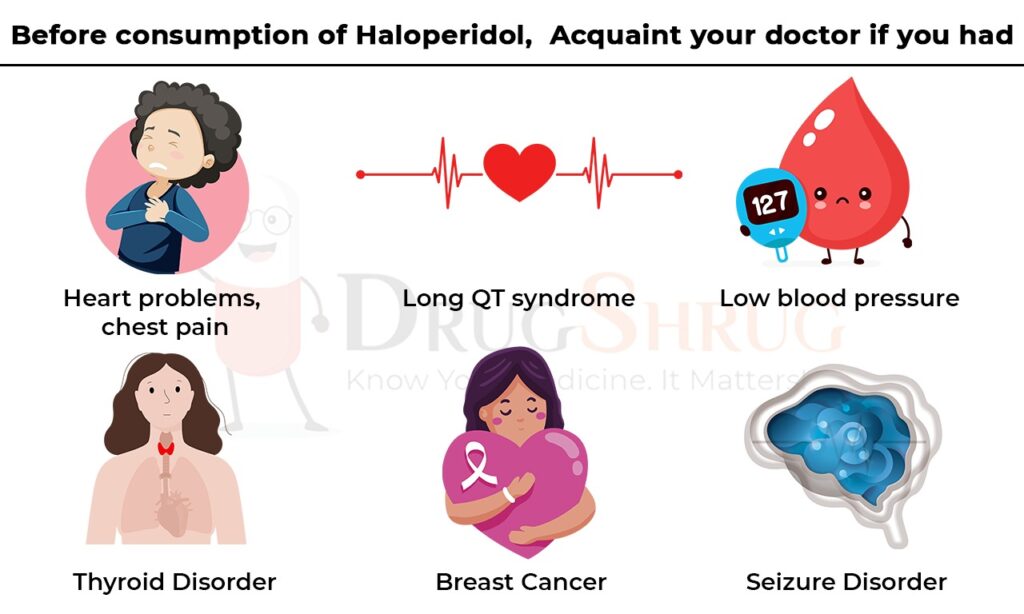
- a thyroid disorder;
- breast cancer; or
- an electrolyte disparity (e.g., low levels of potassium or magnesium in blood).
If you are expecting and using antipsychotic drugs in the last 3 months of pregnancy it may lead to breathing issues, feeding issues, or withdrawal indicators in the newborn. If you become pregnant, apprise your doctor immediately. Avoid using this medication without your doctor’s guidelines. Avoid breast-feeding your baby while taking this remedy as it might be unsafe.
Ask your doctor about the potential risks from your doctor.
- You should not use haloperidol if you have Parkinson’s disease or certain conditions that affect your central nervous system.
- Haloperidol is not accepted for taking in older adults with dementia-linked psychosis.
- Guzzling alcohol while using this drug may result in side- effects.
Do not perform any dangerous activity unless you are unaware of the effects of this medicine on you. Your motor and other responses may be harmed. Avoid getting up abruptly from a sitting or lying posture, else you may feel light-headed since you bear falls, fractures, or other injuries.
What are the possible side effects of Haloperidol?
If you experience the signs of allergic response such as hives; dizziness, difficult breathing; swelling of your face, lips, tongue, or throat get immediate medical assistance. Elevated doses or continued administration of this drug can inflict serious and incorrigible movement impairment. The more you extend the use of haloperidol, it is highly likely that you might get this disorder, especially in women and aged adults.
Tell your doctor urgently if you face:
- unrestrained muscle movements in face (such as munching, lip smacking, scowling, tongue movement, blinking or eye movement);
- muscle tremors in the neck, tightness in throat, difficulty in swallowing;
- quick shifts in mood or behaviour;
- fast or thumping heartbeats, fluttering in your chest, short breath, and intense dizziness
- cough with mucus, angina [chest pain], breathlessness
- feeble white blood cell counts: fever, chills, mouth sores, skin sores, sore throat, cough, difficult breathing; or
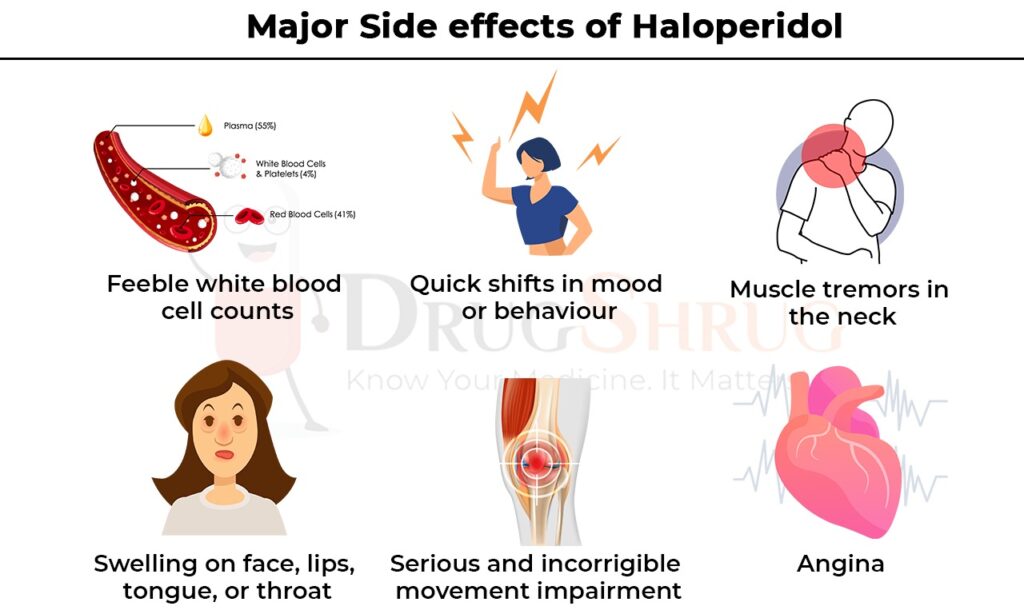
- serious nervous system responses: stiff muscles, high fever, sweating, misperception, fast or uneven heartbeats, shakiness.
Common side effects may comprise
- lethargy;
- headache;
- dizziness, spinning sensation;
- uncontrolled muscle movements;
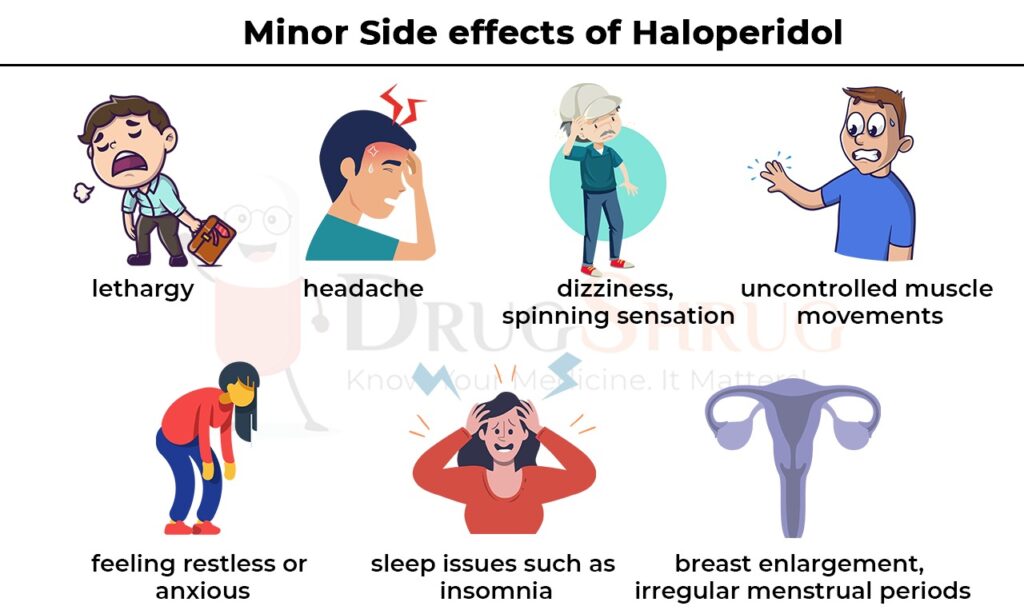
- feeling restless or anxious;
- sleep issues such as insomnia; or
- breast enlargement, irregular menstrual periods.
These are not all the possible side effects as others may occur as well. Talk to your doctor for further information about side effects.
What to do if I miss the dose?
Always try to be punctual in taking your medicine. Although if you miss the dose for any reasons just skip it if it is almost time for your subsequent dose. Refrain from taking two doses at a time.
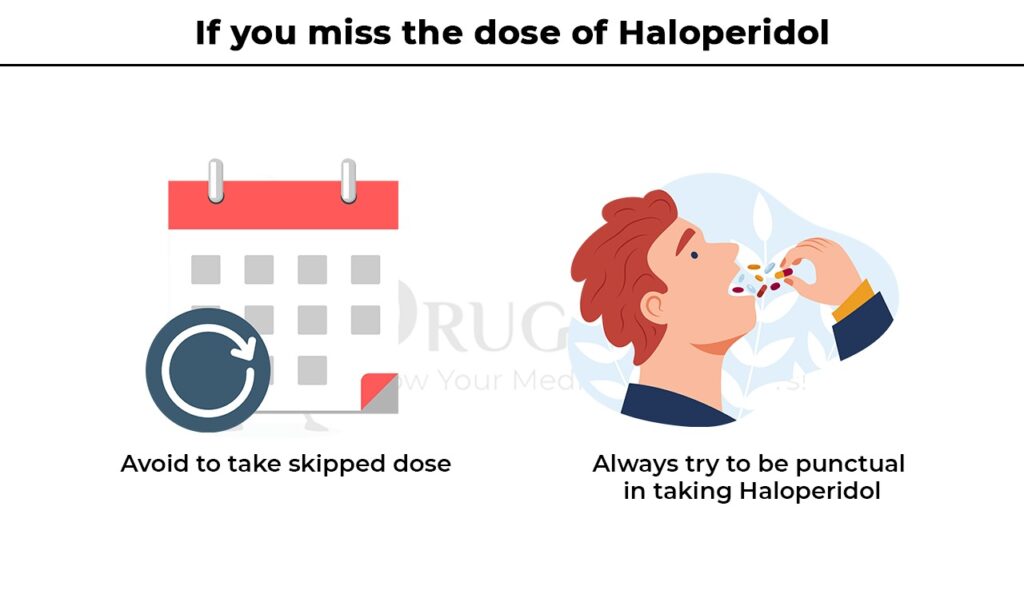
Common Drug Interaction with Haloperidol
This medicine can impose grave heart condition. Taking other medicines for asthma, depression, hypertension, mental illnesses, cancer, HIV, malaria, or infections may heighten your vulnerability to develop heart problems.
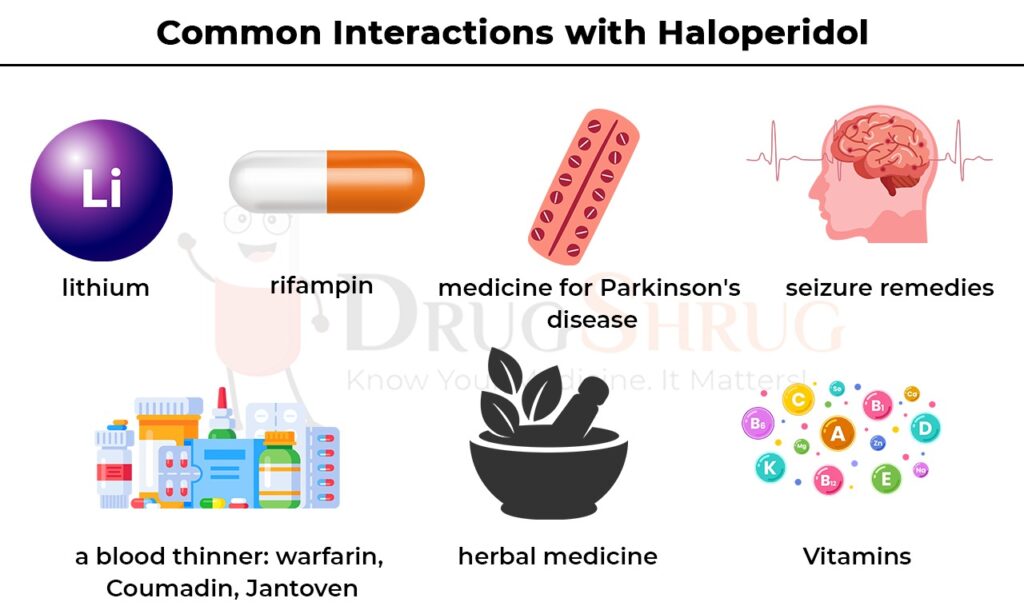
Using haloperidol with some other medicines may make you sleepy or may even exacerbate this effect. Thus, before taking any muscle relaxant, seizure or anxiety medicines, sleeping pills, etc, it is preferred that you consult your doctor.
Acquaint your doctor regarding your other medicines, particularly:
- lithium;
- rifampin;
- medicine for Parkinson’s disease;
- seizure remedies; or
- a blood thinner: warfarin, Coumadin, Jantoven.
This however, is not a complete catalogue of drug interactions with cabergoline. Apprise your medical practitioner about all medicines you take, including prescription and over-the-counter drugs, vitamins, and herbal supplements.
Bottom Line
Haloperidol is an antipsychotic drug given to treat schizophrenia and some issues related with Tourette’s syndrome. This medicine, however, should be taken under strict adherence with the directions of your physician else a person may face serious consequences. In case you experience any side- effects immediately rush to the doctor.
Further Reading:
